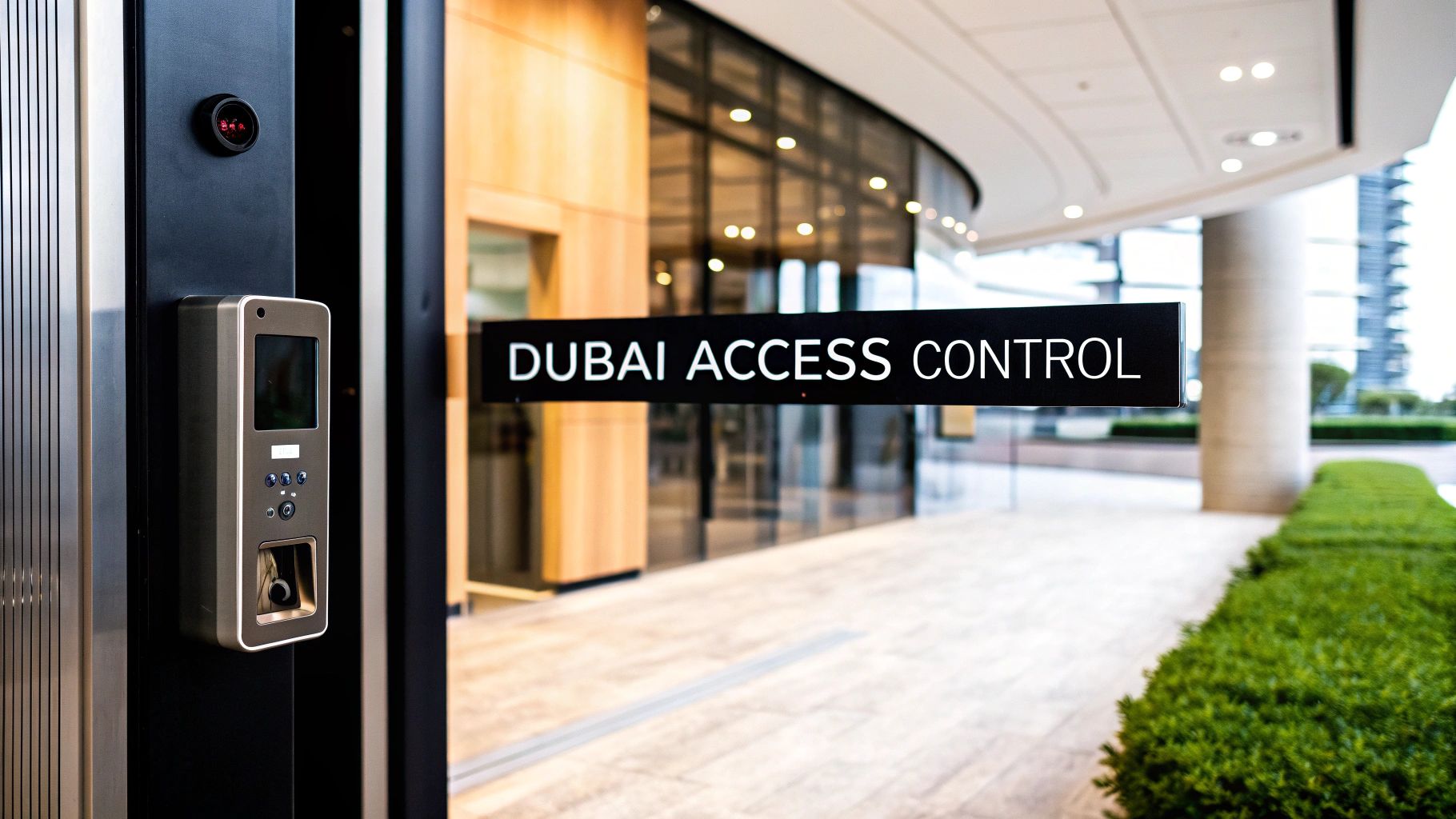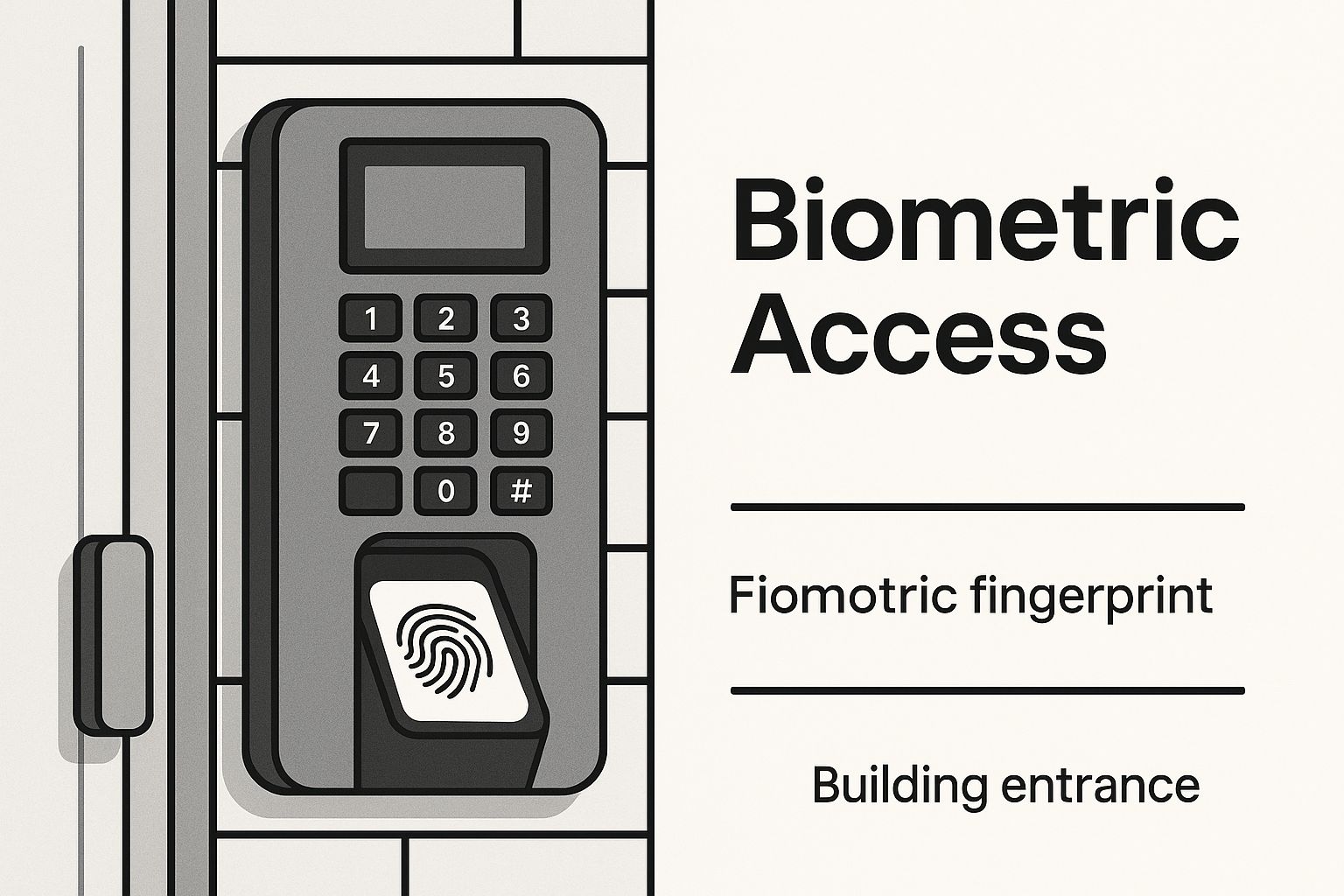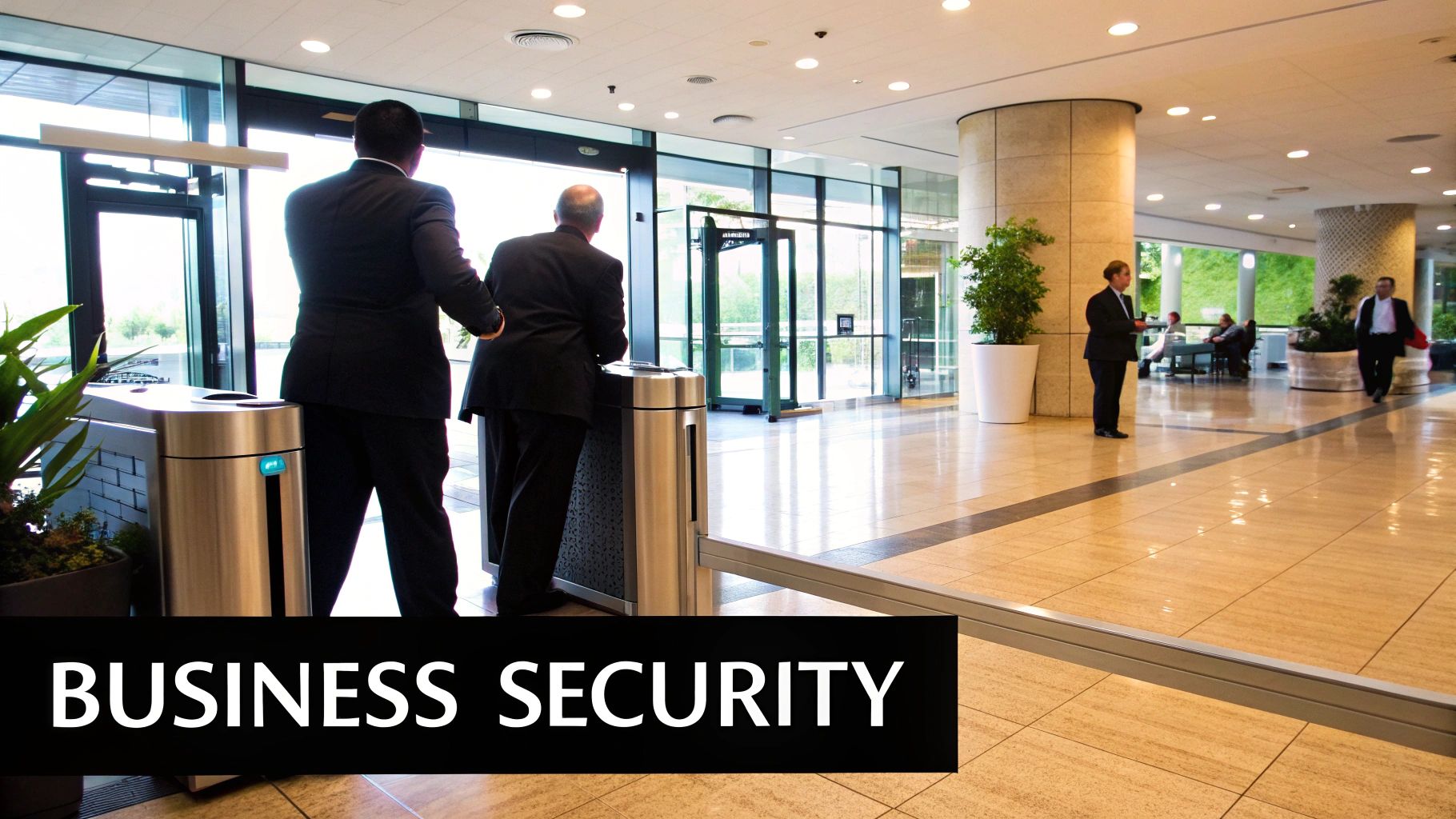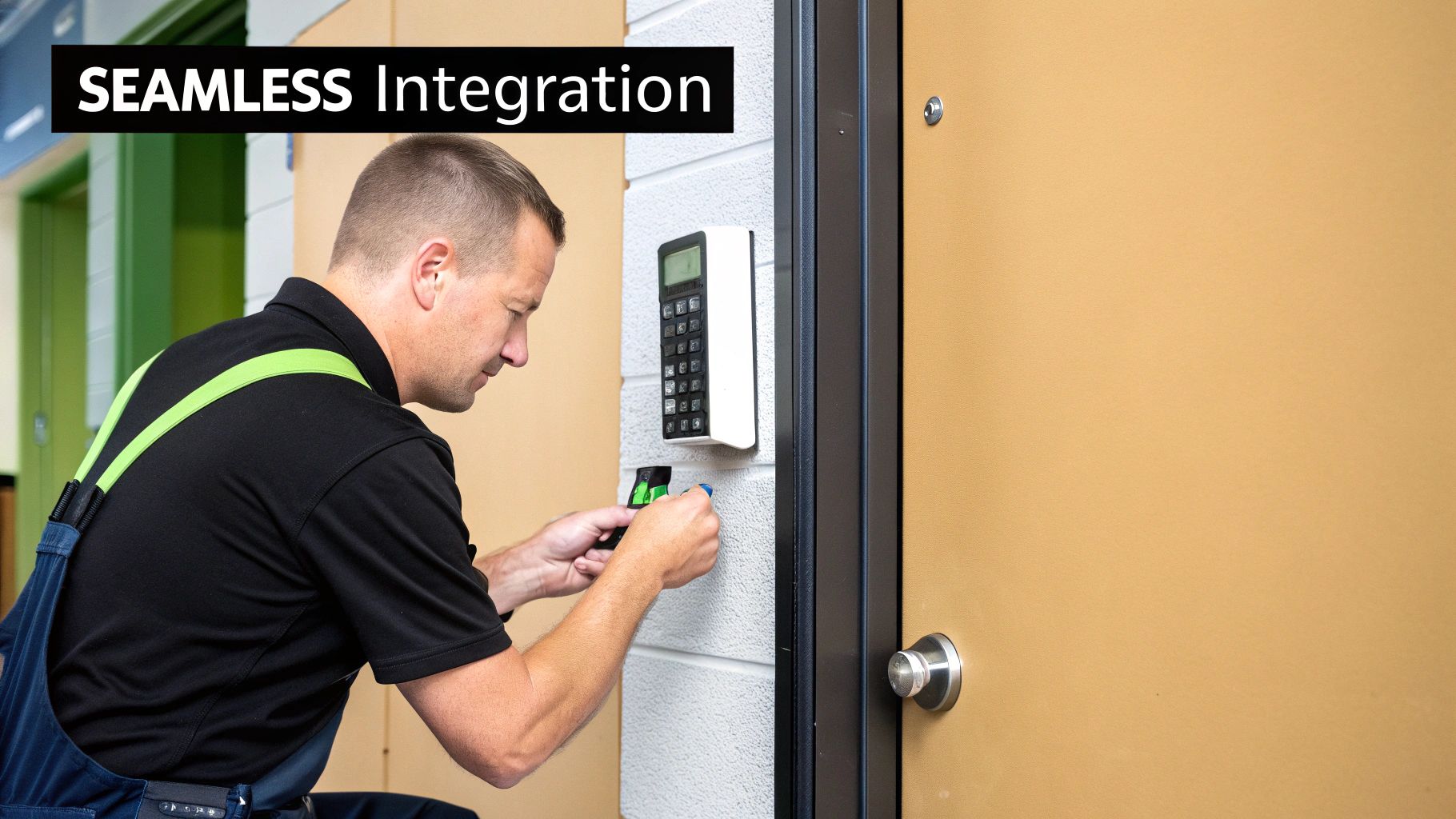
In a city that builds the future, security can’t be an afterthought. It’s the bedrock of trust for every ambitious project and landmark building. That’s where modern access control systems in Dubai come in, acting as the smart gatekeepers for businesses and homes across the emirate.
Why Smart Access Control Is a Necessity in Dubai
Remember the old security guard with a clipboard and a logbook? They could check an ID and wave someone through, but that was about it. Now, picture a digital doorman working 24/7, one that never gets tired and knows precisely who can go where, and when. That’s what a modern access control system does. It’s a huge leap from a simple lock and key to an intelligent, data-led security strategy.
For a global hub like Dubai, this kind of control isn’t just a nice-to-have; it’s essential. These systems are the first line of defence, protecting everything from sensitive data in a DIFC corporate office to families living in a Dubai Marina high-rise. They safeguard assets, protect people, and ensure that business operations run smoothly and securely.
A Market Fuelled by a Vision for the Future
The UAE’s relentless drive for innovation means that advanced security isn’t just an option—it’s the standard. This national focus, especially with government support for biometrics and AI, has pushed the security industry to modernise rapidly.
This commitment to world-class security is clearly visible in the numbers. In 2024, the UAE’s access control market was valued at USD 115.23 million. It’s expected to surge at a compound annual growth rate (CAGR) of 10.8%, hitting nearly USD 236.23 million by 2031. You can learn more about the factors driving this growth and read the full research on the UAE access control security market.
What a Modern System Really Does
So, what’s happening behind the scenes when you tap your card on a reader? It’s more than just a door unlocking. A professional access control system in Dubai performs several critical tasks that create a powerful security net.
Here are its core functions:
- Authentication: First, it confirms you are who you say you are. This is done with a credential, whether it’s a key card, a PIN code, your fingerprint, or even an app on your phone.
- Authorisation: Next, it checks if you’re allowed to be there at that exact moment. For example, a marketing manager might have access to the main office anytime, but the system would block their entry to the server room.
- Audit and Reporting: Finally, it keeps a detailed record of every single access attempt, both successful and failed. This digital trail is crucial for tracking movement within a building or investigating any security incidents.
Together, these functions turn a simple doorway into a smart, responsive checkpoint, offering a level of security that a traditional lock and key just can’t provide.
Decoding the Different Types of Access Control
When you start exploring the wide world of access control systems Dubai has on offer, it’s easy to get sidetracked by the tech. Keypads, biometrics, mobile apps—they’re all important, but they’re just the tools. Before you look at any hardware, you need to understand the philosophy behind the system. These are the core models that dictate how the system decides who gets in and who stays out.
Think of it like setting the rules for an exclusive community. Do you give every resident a master key that they can copy for friends? Or does a central security office have to approve every single visitor? Each method changes the balance between security and convenience.
Mandatory Access Control (MAC)
Picture a high-security government building or a sensitive data centre. In these places, security isn’t just a priority; it’s absolute. This is the domain of Mandatory Access Control (MAC), the most rigid and secure model you can implement.
With a MAC system, the owner of a resource doesn’t get a say. Instead, a central authority—like a system administrator—assigns a security classification (think “Confidential” or “Top Secret”) to every person and every asset, whether it’s a file or a physical room. You only get access if your personal clearance level is equal to or higher than the resource’s classification. It’s a top-down, no-exceptions structure where individuals have zero control.
- Analogy: It’s like a classified government archive. A researcher with “Confidential” clearance can access files marked “Confidential,” but the system will automatically block them from anything labelled “Top Secret.” The archivist can’t make an exception; the rule is hard-coded.
This model puts security above all else, making it the right choice for environments where a data breach would be catastrophic.
Discretionary Access Control (DAC)
Now, let’s switch gears to a completely different environment, like a collaborative co-working space or a nimble marketing agency. Here, flexibility and ease of use are key, which is where Discretionary Access Control (DAC) comes into its own. It’s the most common and intuitive model.
Under DAC, whoever owns a resource gets to decide who can access it. If you create a new project proposal, you have the “discretion” to share it with your team, giving them permission to view or edit it.
This model is all about trust and individual responsibility. It empowers people to manage their own work and collaborate freely. But that flexibility can also be its biggest weakness. Permissions can be shared too widely by mistake, creating security holes.
For instance, an employee could accidentally give an entire department access to a sensitive client folder. It’s a simple mistake, but one that is far less likely to happen under a stricter model.
The image below shows how modern technologies like biometrics can be used to enforce these access rules, blending robust security with user-friendly operation.

Here, a fingerprint scanner acts as the physical gatekeeper, but the decision to grant or deny entry is based on the underlying rules set by the control model—be it DAC, MAC, or RBAC.
Role-Based Access Control (RBAC)
For most businesses in Dubai—from corporate headquarters in DIFC to sprawling hotel resorts—the total lockdown of MAC is too restrictive, and the open nature of DAC is too risky. They need something in the middle: a system that provides solid security without slowing down day-to-day operations.
This is the sweet spot for Role-Based Access Control (RBAC).
RBAC assigns permissions not to individuals, but to their job function or role within the company. So, instead of giving access to “Khalid” or “Sara,” you grant permissions to the “Finance Manager,” “Sales Director,” or “IT Support” roles. Anyone assigned to that role automatically gets all the access rights that come with it.
It’s an incredibly smart and efficient way to manage access. When a new person joins the finance team, you just assign them the “Accountant” role. Instantly, they can access the accounting software, financial drives, and the accounts office—and nothing else. When someone leaves, you simply deactivate their role, and all their access is revoked in one go.
RBAC in Action: A Dubai Hospital Example
- Doctors: Can access patient medical records, prescription systems, and restricted surgical wings.
- Nurses: Can access patient wards and medication storage but not surgical areas or doctor-specific records.
- Admin Staff: Can access billing software and appointment schedules but are blocked from clinical data.
- Pharmacists: Can only access the pharmacy and its dedicated inventory system.
This approach dramatically simplifies managing access control systems in Dubai for any organisation with a complex structure or frequent staff changes, making sure people have exactly the access they need to do their job—no more, no less.
Comparing Access Control Models for Dubai Facilities
Choosing the right control model is fundamental to your security strategy. This table breaks down the core differences to help you decide which framework best aligns with your facility’s needs in Dubai.
| Control Model | Control Principle | Flexibility | Best For | Dubai Example |
|---|---|---|---|---|
| DAC | Resource owner decides who has access. | Very High | Small, collaborative teams where trust is high. | A boutique design agency or a tech startup. |
| MAC | System-wide rules and classifications govern access. | Very Low | High-security environments with sensitive data. | A government data centre or a military installation. |
| RBAC | Access is based on the user’s job function or role. | Medium | Most businesses with defined departments and employee hierarchies. | A large corporate office, a hospital, or a university campus. |
Ultimately, RBAC often provides the best balance of security and manageability for the majority of commercial and public facilities in Dubai. It aligns security permissions with organisational structure, which is both logical and highly effective.
The Technology Behind Modern Building Security

When you see a door unlock with a tap or a glance, there’s a lot more happening than meets the eye. Behind that simple action is a sophisticated partnership of hardware and software—the engine that drives the access control systems Dubai depends on. Getting to know these core technologies helps you understand the magic behind that split-second decision when a door grants or denies entry.
Think of the most basic systems, like the traditional keypad. They are workhorses—reliable and easy to understand. You just punch in a Personal Identification Number (PIN), and you’re in. While they’re perfectly fine for low-risk areas, they have a classic vulnerability: PINs can be shared, forgotten, or even spotted by a prying eye, making them less suited for places that need tighter security.
Seamless Card-Based Access
A big step up from keypads is the card-based reader, which has become a fixture in corporate offices and residential towers across Dubai. These systems work with credentials like magnetic stripe cards or, far more commonly these days, proximity cards.
Proximity cards use technologies like Radio-Frequency Identification (RFID) or Near Field Communication (NFC) to make access feel almost effortless. There’s no swiping involved; a user just needs to hold their card near the reader. This simple “tap-and-go” motion is a game-changer for managing the flow of people in busy buildings, keeping things moving without compromising on security.
The real beauty of these systems is how they handle changes. If an employee leaves or a card goes missing, an administrator can instantly revoke its access from a central software dashboard. No more changing locks, no more reissuing dozens of physical keys.
The Rise of Biometric Technology
For situations demanding the highest level of security, many organisations are now embracing biometrics. This technology doesn’t rely on something you have (like a card) or something you know (like a PIN). Instead, it verifies you based on who you are—your unique biological traits.
Biometrics make a powerful promise: the credential can’t be lost, stolen, or shared. It is physically tied to the individual, creating an undeniable link between a person and their request for access.
Here are the most common biometric methods you’ll find in access control systems Dubai:
- Fingerprint Recognition: This is one of the most popular and trusted biometric methods. It works by analysing the distinct patterns of ridges and valleys on your finger. It’s fast, dependable, and affordable enough for most commercial uses.
- Facial Recognition: Here, advanced cameras create a digital map of a person’s facial geometry. This technology enables truly hands-free access; you can be identified and the door unlocked just by walking up to it. It offers incredible convenience.
- Iris Recognition: By scanning the complex and unique patterns in the coloured part of your eye, these systems deliver an extremely high level of accuracy. Because a person’s iris pattern is set for life, this method is often reserved for high-stakes environments like data centres or research facilities.
Biometrics in Action: The Dubai Airports Case
If you want to see biometrics working flawlessly on a massive scale, look no further than the smart gates at Dubai Airports. The UAE’s phenomenal growth in tourism and its expanding urban centres have made efficient, high-security solutions an absolute necessity. At the airports, the number of passengers using biometric smart gates exploded from just over 5.6 million in 2017 to more than 21.1 million in 2023.
This incredible volume is handled by 127 operational smart gates that use facial and iris recognition to process travellers in mere seconds. This system drastically speeds up passenger flow while simultaneously tightening border security. You can read more about how proximity systems support security in the region to see the broader impact.
This real-world example proves that advanced access control isn’t just about locking a door. It’s about creating smarter, safer, and more efficient environments, even in the most challenging and high-traffic settings imaginable.
Business Benefits Beyond Just a Locked Door
When business owners in Dubai think about access control, the first thing that usually comes to mind is a better lock. And while boosting security is absolutely central, a modern system does so much more. It delivers real, tangible business benefits that go far beyond simply keeping a door locked, turning your workplace into an environment that’s not just secure, but also smart and efficient.
The most obvious win is ditching traditional keys for good. Let’s be honest, physical keys are a liability. They get lost, stolen, or copied far too easily, which can lead to a security headache and the expense of re-keying an entire building. With an electronic access control system in Dubai, a lost keycard or fob can be instantly disabled from a computer or phone in a matter of seconds. The threat is gone, just like that.
Unlocking Efficiency and Powerful Insights
One of the most powerful features, and one that’s often underestimated, is the audit trail. Imagine a digital logbook that’s always on, meticulously recording every time a door is opened—who entered, which door it was, and the exact time. It’s an unchangeable record of every single access event. This data is pure gold.
Say a critical server room is accessed at 3 AM. Instead of guessing, you have an immediate, concrete record of who was there. This kind of information is vital for investigating any incidents, sorting out disputes, and simply holding people accountable.
This digital log doesn’t just help you react to problems; it helps you get ahead of them. By looking at access patterns over time, you can spot workflow bottlenecks or potential security gaps before they become serious issues. It flips security from a reactive measure into a proactive management tool.
Fostering a Safer and More Professional Workplace
Beyond protecting your physical assets, these systems have a direct impact on your team’s safety and peace of mind. When employees know that only authorised people can get into certain areas, it creates a much more secure atmosphere. This is especially crucial for zones with hazardous materials, expensive equipment, or confidential employee data.
A professional access control system also completely changes how you handle visitors. Forget the old-fashioned paper sign-in book. You can issue temporary passes or mobile credentials that expire automatically after a set time. This doesn’t just tighten security; it projects a polished, professional image to every client, partner, and guest who walks into your Dubai office.
- Eliminate Re-keying Costs: Instantly revoke access for lost cards or departed employees. You’ll save thousands of dirhams you would have spent on locksmiths.
- Improve Employee Safety: Create secure zones by restricting access to high-risk areas, protecting your team from potential dangers.
- Streamline Visitor Management: Give guests temporary credentials that only work in approved areas and for a specific time, ensuring they can’t wander where they shouldn’t.
- Integrate for Total Security: Connect your access control with your CCTV cameras. If an unauthorised card is used at a door, it can automatically command the nearest camera to start recording, giving you visual proof for every event.
At the end of the day, investing in a quality access control system in Dubai is about more than just security. It’s about building an intelligent framework that supports your daily operations, protects your people, and gives you the data you need to run your business better.
How To Choose the Right Access Control System

Picking the right security system is a major decision. It’s far more than just buying technology; it’s about finding the perfect fit for your property’s unique security rhythm here in Dubai. What works wonders for a quiet villa in The Springs won’t be suitable for a high-traffic office tower in JLT. The key is to step back and take a clear, honest look at what you truly need.
To get this right, you need a strategy. This means weighing several crucial factors to land on a solution that’s not just secure, but also practical and fully compliant with local regulations. Let’s walk through the essential checkpoints that will guide you to a smart investment.
Assess Your Core Security Needs
First things first: you have to define exactly what—and who—you’re protecting. Security isn’t a one-size-fits-all game. A public-facing shop floor has completely different vulnerabilities compared to a high-security data centre holding sensitive information, even if they’re in the same building.
Start by asking a few fundamental questions:
- What are my high-risk areas? Pinpoint the critical zones. This could be a server room, a cash office, or a storeroom with valuable inventory. These places demand tighter controls, perhaps even multi-factor authentication like a card plus a PIN.
- What is the primary threat? Are you trying to prevent unauthorised public access, stop internal theft, or safeguard intellectual property? Your biggest concern will dictate the kind of technology you should prioritise.
- How many people need access? Think about your total number of employees, residents, or regular visitors. A system managing 10 users has very different requirements from one built for 1,000, which impacts everything from the hardware to the management software.
Plan for Scalability and Future Growth
Your business today won’t be the same in five years. A classic mistake is choosing a system that only solves today’s problems, boxing you in down the road. A quality access control system in Dubai should be a long-term asset, not a temporary patch.
Think ahead. Are you planning to expand to another floor or open a new branch office? Do you see yourself integrating other security tools like CCTV cameras or alarm systems in the future? Choosing a modular, scalable system from day one will save you a world of expense and hassle later on.
An expandable system allows you to add more doors, users, and features as your organisation evolves. This forward-thinking approach ensures your initial investment continues to deliver value for years to come.
Understanding SIRA Compliance in Dubai
In Dubai, security isn’t just a good idea—it’s the law. The Security Industry Regulatory Agency (SIRA) sets mandatory standards for security systems. For most commercial, residential, and public properties, getting SIRA approval for your access control installation is non-negotiable.
Cutting corners here is simply not an option. Installing a non-compliant system can result in hefty fines and even orders to halt operations. It’s vital to work with a SIRA-certified provider who lives and breathes these regulations. They will ensure both the equipment and the installation process stick to every local rule, giving you genuine peace of mind.
Aligning Technology with Budget
Finally, let’s talk budget. While it’s tempting to jump straight to the most advanced biometric readers for every entryway, that might be overkill. A more practical and cost-effective approach is often a hybrid model. For instance, you could secure lower-risk areas like staff rooms or kitchens with simple, reliable PIN-based keypads.
In fact, PIN-based access control is a major player in the UAE’s security market, particularly in commercial buildings where the goal is to eliminate physical keys. With commercial structures accounting for around 18% of all buildings in Abu Dhabi, securing them with systems that allow for periodic PIN changes has become a trusted and effective method. You can read the full research about the Middle East’s PIN-based access market for a deeper dive.
For your high-security zones, you can then invest in more robust solutions like fingerprint or facial recognition readers. This balanced strategy helps you put your resources where they matter most, achieving rock-solid security without breaking the bank.
Your Questions on Dubai Access Control Answered
Choosing the right security hardware brings up a lot of practical questions. We get it. To help bring some clarity, we’ve pulled together the most common queries we hear about selecting, installing, and managing access control systems in Dubai. Every answer is rooted in our local experience, giving you the practical insights you need to make a confident decision.
What Is SIRA Approval and Why Is It Mandatory?
Think of SIRA, the Security Industry Regulatory Agency, as the gatekeeper for quality in Dubai’s security industry. SIRA approval isn’t just a nice-to-have badge; it’s a mandatory seal of approval for security equipment and the companies that install it. For nearly all commercial, public, and large residential buildings, this certification is a non-negotiable legal requirement.
It’s your guarantee that the system you’re buying, the way it’s installed, and the company you hire all meet strict government standards for performance and safety. Trying to cut corners with a non-SIRA approved system can lead to hefty fines and even stop your business operations. Before you sign anything, always confirm that both your provider and the specific hardware are SIRA-certified for your type of property.
Can I Integrate a New System with My Existing CCTV?
Absolutely. In fact, this is where modern security really shines. Most quality access control systems are built to talk to other security platforms, especially CCTV networks. When you link them up, you create a security ecosystem that’s far smarter and more responsive.
Imagine this: an unauthorised card is swiped at a high-security door. Instead of just logging a denied entry, the access system instantly tells the nearest camera to swivel, zoom in, and record what’s happening. This turns a simple log entry into real-time, actionable evidence.
When you’re talking to suppliers, make sure to mention the brand and model of your current CCTV setup to ensure they’ll play nicely together.
How Do Biometric Systems Handle Data Privacy?
This is a huge—and valid—concern. Reputable biometric systems are designed with privacy at their core and are fully compliant with UAE data protection laws. They don’t store an actual image of your fingerprint or face.
Here’s how it works: the system captures your unique biometric data and converts it into an encrypted digital template. This is just a unique string of code, not a picture. Crucially, this process is a one-way street; the template can’t be reverse-engineered back into an image. The system simply compares a live scan to the stored template to find a match. Always choose a provider who is transparent about their data encryption, storage, and management policies.
What Happens to the Doors During a Power Failure?
Any professional access control system in Dubai is built to handle a power outage. It’s a fundamental part of the design. Systems always include battery backups or are wired into an Uninterruptible Power Supply (UPS) to keep them running when the main power goes down.
Depending on safety rules, doors are set up in one of two modes:
- Fail-Safe: The door automatically unlocks when power is cut. This is critical for fire exits and main escape routes, ensuring everyone can get out safely in an emergency.
- Fail-Secure: The door remains locked when power is cut. You’ll find this on high-security areas like server rooms or vaults, where keeping assets protected is the top priority, even during an outage.
Your certified installer will configure every door correctly to meet local fire and life safety codes, ensuring you’re both safe and compliant.
Ready to secure your premises with a system that meets all Dubai’s regulatory standards? OMX Solutions L.L.C. offers SIRA-approved access control solutions designed for reliability and performance. Secure your free consultation and quote today.
Article created using Outrank
